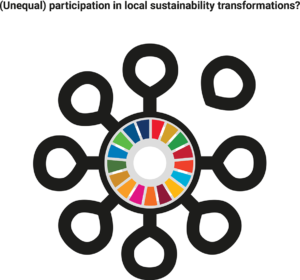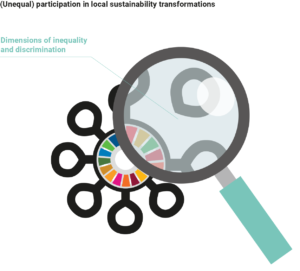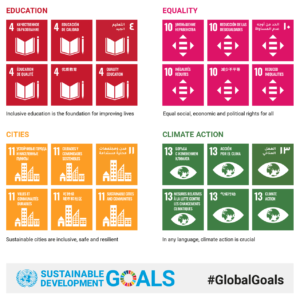What?
The project Sustainability without Exclusion addresses two issues:
- Participation
- Sustainability transformations as initiated, for example, by local projects, national funding programmes, environmental initiatives or organisations
In summary, we are concerned with the social question in political and/or transformative efforts towards sustainability. We develop collective learning formats for this.
Why?
One example: More and more regions, cities and municipalities are pursuing the goal of sustainability. Sustainability can be understood and implemented in very different ways. Many strategies of municipal institutions focus, for example, on achieving the climate protection goal as quickly as possible. However, there are inequalities in the opportunities to participate in climate protection. Sustainability, however, equally demands the greatest possible political participation. In this constellation, we want to support participation claims and potential participants.
Our objectices

The project aims to strengthen the social dimensions in political and/or transformative efforts towards sustainability and to support the social claim of sustainability. The project aims to address and understand the exclusion of groups from political efforts towards sustainability and to communicate concrete, implementable proposals and recommendations. This means making inequalities visible, acknowledging them, dealing with them critically, taking collective responsibility, being able to communicate and share insights, experiences and reflection collectively, and thus also making visible and establishing connections between structurally similar projects.
We link to collective learning processes that enable the joint development of a democratic and decentralised culture of participation as a breeding ground that contributes to efforts to implement sustainability.
Building on this, another goal is to further develop transformative methods of research and learning while strengthening sustainability without exclusion.
..and why?
This project arises from various motivations and impulses, not least from those who will help shape it. We list here exemplary first frames of reference, but work with much more (epistemic justice, etc.):
a) We make our project compatible with the Sustainable Development Goals (SDGs) from the United Nations Agenda 2030, especially the goal on education (SDG 4) and the goal on reducing inequalities (SDG 10). Anyone working on sustainability will quickly come across this 2015 United Nations document, including its 17 Sustainable Development Goals (SDGs).
The goal on education means ensuring inclusive and equitable quality of education and promoting lifelong learning opportunities for all.
For Sustainable Development Goal 10 in particular, the reduction of inequalities is a goal of sustainability and is therefore explicitly assigned an intrinsic value in its context. This explicitly refers to inequalities between nation states as well as within nation states.
b) In addition to these two social sustainability goals in the 2030 Agenda, there are further frames of reference that legitimise and justify our project:
The UNESCO programme Education for Sustainable Development beyond 2019 positions, alongside civic and political education, a “just world” as the overarching goal of sustainability and education (UNESCO 2019, Annex I 5.; own translation).
Arjen Wals researches education for sustainable development and writes as goals of “sustainability learning” (Wals 2020), among others, a “participation minimally distorted by power relations” (ibid., 62) and “pluralism, diversity and minority perspectives” (ibid.).
Education for Sustainable Development as a policy, action and research area has existed long before the SDGs were adopted in 2015. But for its new program, UNESCO refers back to the framework of the SDGs. This delivers the possibility to more easily link education and learning to other dimensions of sustainability, as to inequality. This allows complex projects on the subject to refer to the UN’s determination of sustainable development, which means access to resources.
c) As a third rationale for our project, we argue that reducing inequality in participation in political and/or transformative efforts for sustainability, ergo a diversity of perspectives on sustainability, counteracts consequences when unexpected risks are overlooked in concrete political decisions for sustainability due to perspective narrowing.
With whom and through what do we implement our project goals?
The management structure of our project is complex, we work on and with different levels and (groups of) people:
Through a series of workshops and seminars, which we started in October 2020, we are further developing, as a methodological module, the Virtual Narrative Space for Sustainability without Exclusion, among others in cooperation with experts on storytelling and education for sustainable development as well as on transdisciplinary methodological development:
Events in Lüneburg in autumn 2020: Starting Week and Project Seminar at Leuphana University
As a first project module and thus the kick-off of our project in October, we created a video on the project topic “How can you participate in local sustainability transformations?”, which serves as an impulse for a one-week virtual accompaniment for freshman students as part of the Leuphana starting week ‘Future meets Cities’.
With the project seminar, which we carried out in the winter semester from October 2020 to March 2021, we analyzed and researched the specific sustainability situation in Lüneburg, from which and for which we are learning. We worked in the module Responsibility and Sustainability, which is open to all freshman students in college. It is inscribed in the university didactic concept of inquiry-based learning.
We addressed the same question (“How can you participate in local sustainability transformations?”) in two seminars with young Alevis in Germany and a group of students from different federal states and schools in Germany.
With the seminars we address…
-the importance of reducing injustices in and for sustainability transformations
-understanding the reasons for situations and structures of inequality in political participation – in and at local sustainability transformations
-recognising asymmetric and politicising tendencies within transformation processes
-recognise one’s own position, responsibility, options for action and impacts in local sustainability transformations
-the own contribution to local efforts to implement the sustainability goals
-the ability to evaluate (media information on and about) sustainability transformations as a necessary prerequisite for political participation.
Furthermore, we strive to cooperate with environmental initiatives and organisations. For example in a workshop at the Attac summer academy, this year.
And we organise heterogeneous workshops both with institutionalised decision-makers and with groups and individuals from civil society, research, city administration, politics, NGOs, when it comes to local sustainability efforts and citizen participation.
We also organise workshops for transdisciplinary, scientific conferences that bring together people working on sustainability, participation and corresponding collaborative methodologies. Through our participation in international conferences, we can also make visible and help establish connections between structurally similar projects.
Through and flanking these different formats with different (groups of) people, we also interweave theoretical concepts that make sustainability without exclusion possible, ground and strengthen it.
And how? Our methodological approaches
We want to combine transdisciplinary, transformative research, (un)learning and practice.
Our transformative, methodological approach is participatory, intercultural, encouraging and question-based (e.g. Who are we as a city? Who can participate in local sustainability transformations and how?). It listens to all the voices of the participants in order to integrate the different experiences and knowledge and to arrive at a collective view. It takes into account both the process and the results. Examples are design, photo or narrative methods.
With transformative methods, we strengthen creativity, ability to criticize and analyze, “constructive hope” (Wals 2020, 71) and courageous initiatives, for and within sustainability transformations.
On the one hand, this includes becoming aware of one’s own position, goals, needs, wishes and (political) options for action within sustainability transformations, by working out different experiences with sustainability issues, i.a. with the effects of climate change.
Our methods start from people and their differences as well as dimensions of discrimination (Wals 2020; Backhaus and Tittor 2019). In doing so, we relate them to constellations of people, in a specific sustainability situation, in order to derive collective action strategies.
Furthermore, those learning processes are initiated which aim to evaluate media information about and in sustainability transformations, and are not limited to consuming media, knowledge or information. We see this as a necessary condition for political participation.
In this way, we will develop and communicate a definition of political participation that is right for the specific local sustainability situation both with marginalized groups and with institutionalized employees and decision-makers.
An essential part of our project is the communication of (interim) results and findings to various national and local target and interest groups. We work primarily with the following media: web presences, recommendations for action in text form, video, and lecture or discussion formats. In this way, we support as many people as possible who are responsible for, initiate or help shape sustainability transformations. We move the issue of inequality to the centre and at the same time enable the unheard to present their perspectives on socially ecological futures and to influence them politically.
This can create visibility of conflicting side stories, uncertainties, grey areas and anything that is not said – or is not said in mainstream channels. At the same time, it is expressed that sustainability does not allow for either-or thinking, but “can lead to an empathetic connection to reality” (UNESCO 2019, Annex I 7).
We awaken curiosity and courage for transformative methods as a way of dealing with uncertainty and complexity and diversify sources of knowledge. Lighthouse works in German, English, Spanish and plans translations into other languages if necessary.
We welcome your willingness to share your expertise, knowledge and experience on political participation in sustainability efforts with us and others. We also welcome enquiries about specific formats or collaborations.
If you are interested in the Sustainability without Exclusion project, or in a collaboration, or if you know people who are interested, we look forward to receiving your message: Esther@lighthouse.global.

